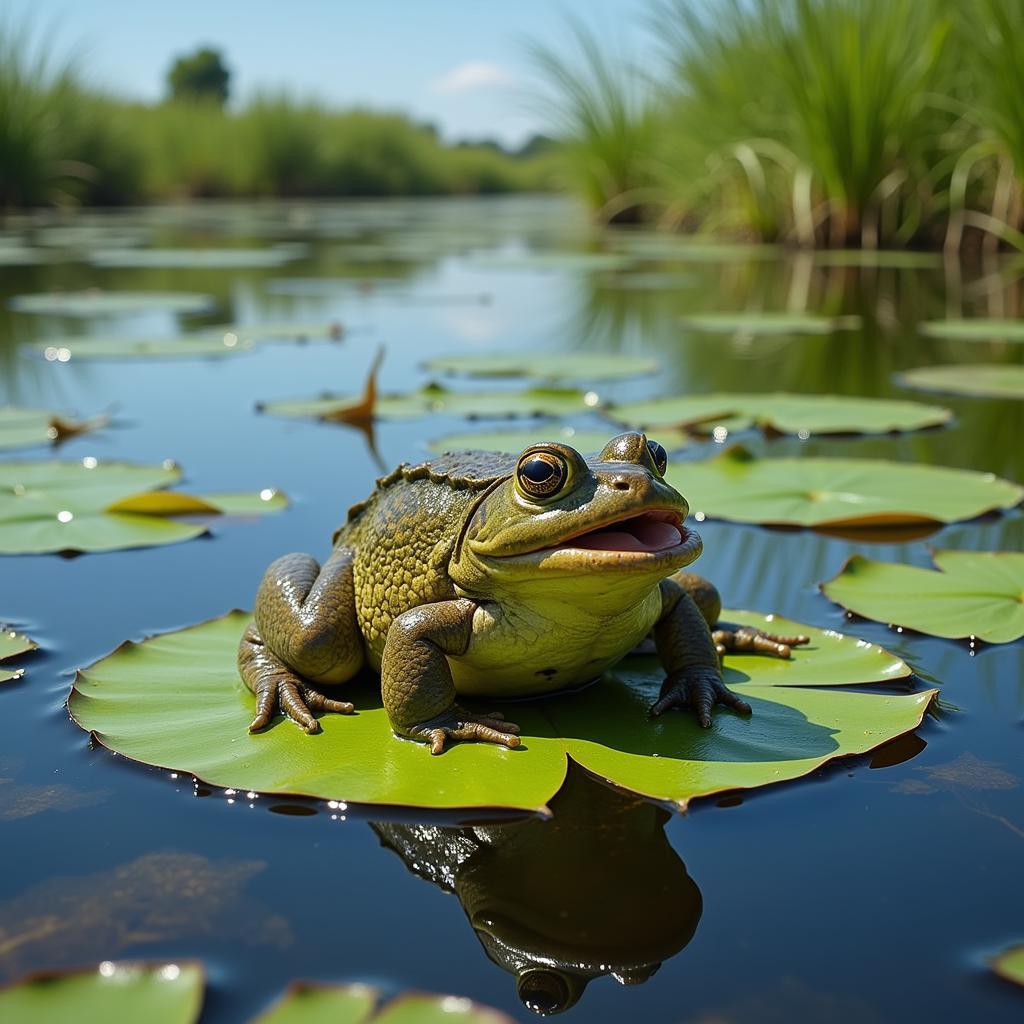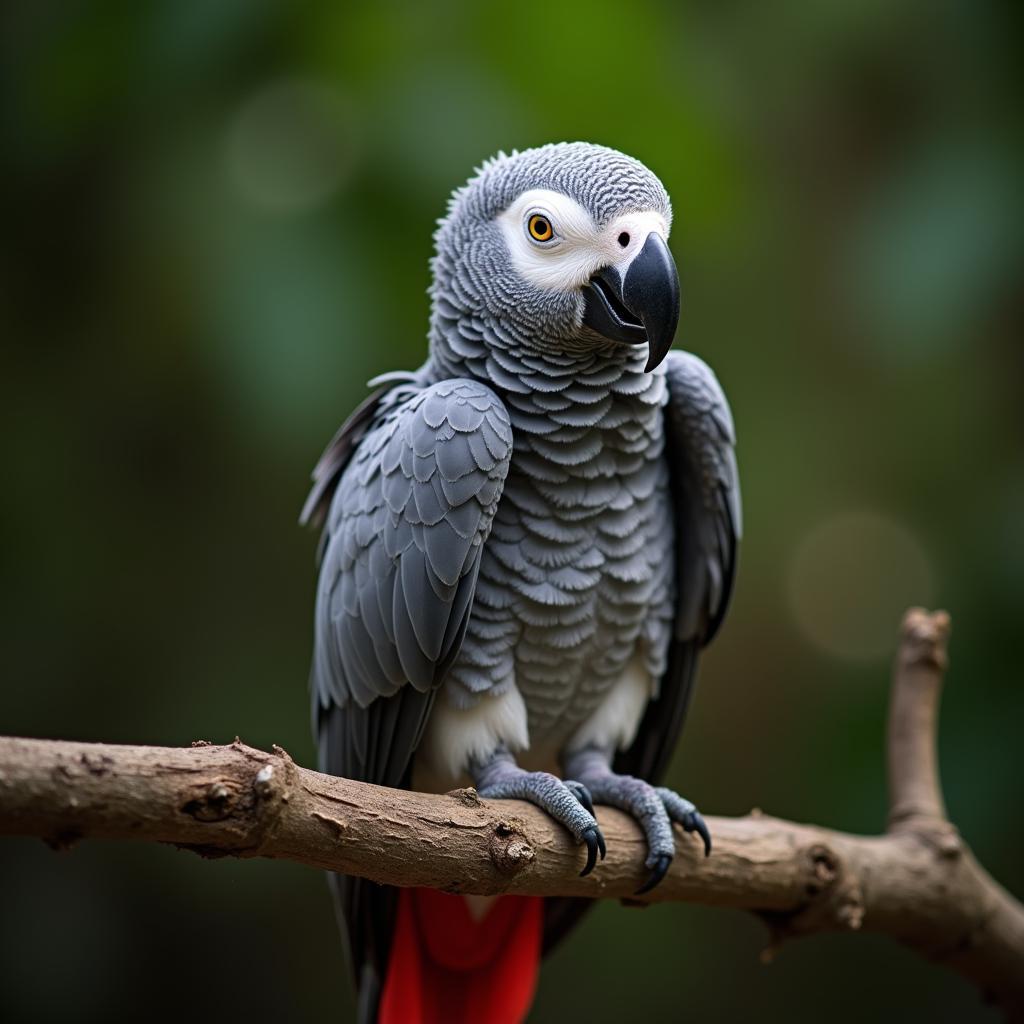The African Bullfrog Croak Sound: A Symphony of the Savannah
The African Bullfrog Croak Sound is an unforgettable part of the African soundscape. It’s a deep, resonant bellow that can carry for over a kilometer, a powerful vocalization that speaks to the strength and presence of these fascinating amphibians. But the African bullfrog croak is more than just a sound; it’s a complex form of communication, a vital part of their life cycle, and a crucial indicator of the health of their wetland habitats.
Deciphering the Deep Croak of the African Bullfrog
What does an African bullfrog croak sound like? Imagine a sound that’s both guttural and melodic, a deep bass rumble that reverberates through the air. It’s often compared to the sound of a large cow mooing, hence the name “bullfrog.” This impressive sound is produced by the males of the species, Pyxicephalus adspersus, one of the largest frog species in Africa.
Why do African Bullfrogs Croak?
The primary reason behind the African bullfrog’s impressive vocalizations is to attract mates. During the breeding season, which typically coincides with the rainy season, males congregate in temporary pools and marshes. They then inflate their vocal sacs, which act as resonating chambers, and let out their booming croaks. These calls serve a dual purpose: attracting females and warning off potential rivals.
Interestingly, the deeper the croak, the more attractive a male is to females. This is because a deep croak signifies a larger, more dominant male, suggesting better genes for potential offspring. The competition for mates can be fierce, and the males engage in territorial displays and even physical confrontations to establish dominance.
The African Bullfrog Croak: More Than Just a Mating Call
While the primary function of the African bullfrog’s croak is related to reproduction, it’s not their only means of communication. These frogs also use a variety of other calls, albeit less dramatic than the mating croak, to signal distress, defend their territory, and communicate with their young. For instance, when threatened, they emit a high-pitched scream that can startle predators.
The African Bullfrog Croak and Environmental Health
The presence, or absence, of the African bullfrog croak can tell us a lot about the health of their wetland habitats. As amphibians, these frogs are particularly sensitive to changes in their environment. Pollution, habitat loss, and climate change all pose significant threats to their populations. A decline in the number of frogs or the frequency of their croaking can be an early warning sign of a larger ecological problem.
“The African bullfrog is a flagship species for wetland conservation,” says Dr. Sarah Jones, a leading herpetologist studying African amphibians. “Their croaking is not just a fascinating natural phenomenon; it’s a vital sign that helps us monitor the health of our wetlands.”
 African Bullfrog in Pristine Wetland
African Bullfrog in Pristine Wetland
The African Bullfrog Croak Sound: An Enduring Symphony
The African bullfrog’s croak sound is a powerful reminder of the rich biodiversity of the African continent. It’s a sound that’s both awe-inspiring and essential, a testament to the complex lives of these creatures and their importance to their ecosystems. As we continue to learn more about these fascinating amphibians, let’s hope that the symphony of the African bullfrog croak continues to resonate across the savannah for generations to come.
FAQs about the African Bullfrog Croak Sound
1. How loud is the African bullfrog’s croak?
The African bullfrog’s croak can reach up to 110 decibels, which is about as loud as a car horn or a live rock concert.
2. How far can an African bullfrog’s croak travel?
Under ideal conditions, an African bullfrog’s croak can travel up to 2 kilometers.
3. Do female African bullfrogs croak?
While female African bullfrogs can vocalize, their calls are much quieter and less frequent than the males’.
4. What time of day are African bullfrogs most vocal?
African bullfrogs are typically most vocal at night and during the breeding season, which coincides with the rainy season.
5. Are African bullfrogs endangered?
While not currently endangered, African bullfrog populations are threatened by habitat loss, pollution, and climate change.
For more insights into the fascinating world of African amphibians, explore our articles on [african froge] and the dietary habits of the [african bullfrog eats frog]. If you’re curious about the differences between these powerful amphibians and the equally impressive Goliath frog, be sure to read our comparative piece on [african bullfrog goliath frog].
Need help understanding the captivating world of African wildlife? Contact us at +255768904061, [email protected], or visit us at Mbarali DC Mawindi, Kangaga, Tanzania. Our team is available 24/7 to assist you.


